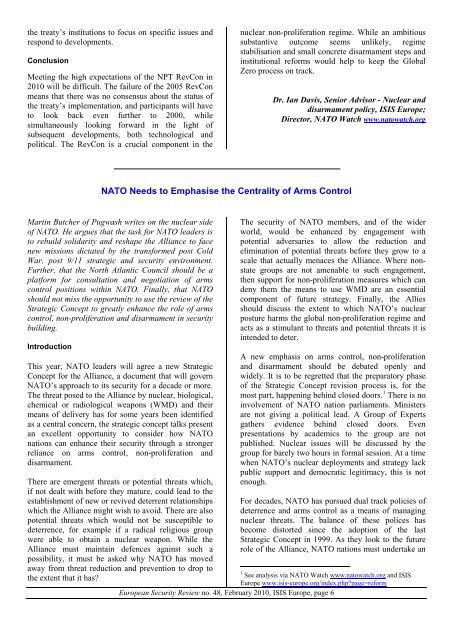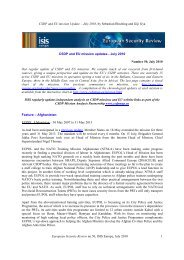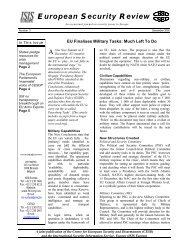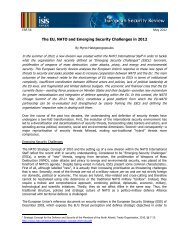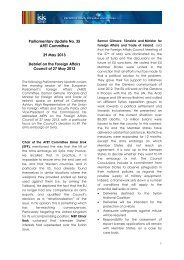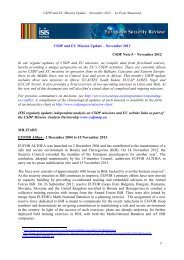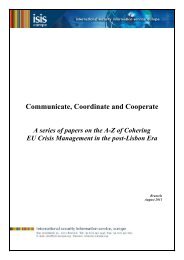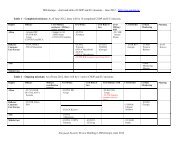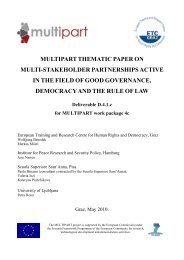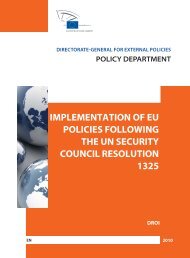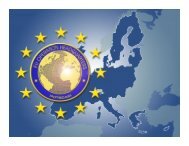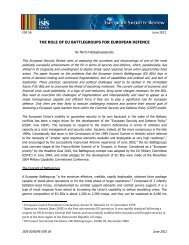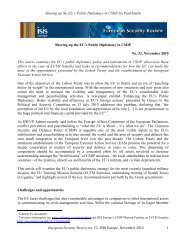ISIS Europe News In This Issue
ISIS Europe News In This Issue
ISIS Europe News In This Issue
Create successful ePaper yourself
Turn your PDF publications into a flip-book with our unique Google optimized e-Paper software.
the treaty’s institutions to focus on specific issues and<br />
respond to developments.<br />
Conclusion<br />
Meeting the high expectations of the NPT RevCon in<br />
2010 will be difficult. The failure of the 2005 RevCon<br />
means that there was no consensus about the status of<br />
the treaty’s implementation, and participants will have<br />
to look back even further to 2000, while<br />
simultaneously looking forward in the light of<br />
subsequent developments, both technological and<br />
political. The RevCon is a crucial component in the<br />
nuclear non-proliferation regime. While an ambitious<br />
substantive outcome seems unlikely, regime<br />
stabilisation and small concrete disarmament steps and<br />
institutional reforms would help to keep the Global<br />
Zero process on track.<br />
Dr. Ian Davis, Senior Advisor - Nuclear and<br />
disarmament policy, <strong>ISIS</strong> <strong>Europe</strong>;<br />
Director, NATO Watch www.natowatch.org<br />
NATO Needs to Emphasise the Centrality of Arms Control<br />
Martin Butcher of Pugwash writes on the nuclear side<br />
of NATO. He argues that the task for NATO leaders is<br />
to rebuild solidarity and reshape the Alliance to face<br />
new missions dictated by the transformed post Cold<br />
War, post 9/11 strategic and security environment.<br />
Further, that the North Atlantic Council should be a<br />
platform for consultation and negotiation of arms<br />
control positions within NATO. Finally, that NATO<br />
should not miss the opportunity to use the review of the<br />
Strategic Concept to greatly enhance the role of arms<br />
control, non-proliferation and disarmament in security<br />
building.<br />
<strong>In</strong>troduction<br />
<strong>This</strong> year, NATO leaders will agree a new Strategic<br />
Concept for the Alliance, a document that will govern<br />
NATO’s approach to its security for a decade or more.<br />
The threat posed to the Alliance by nuclear, biological,<br />
chemical or radiological weapons (WMD) and their<br />
means of delivery has for some years been identified<br />
as a central concern, the strategic concept talks present<br />
an excellent opportunity to consider how NATO<br />
nations can enhance their security through a stronger<br />
reliance on arms control, non-proliferation and<br />
disarmament.<br />
There are emergent threats or potential threats which,<br />
if not dealt with before they mature, could lead to the<br />
establishment of new or revived deterrent relationships<br />
which the Alliance might wish to avoid. There are also<br />
potential threats which would not be susceptible to<br />
deterrence, for example if a radical religious group<br />
were able to obtain a nuclear weapon. While the<br />
Alliance must maintain defences against such a<br />
possibility, it must be asked why NATO has moved<br />
away from threat reduction and prevention to drop to<br />
the extent that it has?<br />
The security of NATO members, and of the wider<br />
world, would be enhanced by engagement with<br />
potential adversaries to allow the reduction and<br />
elimination of potential threats before they grow to a<br />
scale that actually menaces the Alliance. Where nonstate<br />
groups are not amenable to such engagement,<br />
then support for non-proliferation measures which can<br />
deny them the means to use WMD are an essential<br />
component of future strategy. Finally, the Allies<br />
should discuss the extent to which NATO’s nuclear<br />
posture harms the global non-proliferation regime and<br />
acts as a stimulant to threats and potential threats it is<br />
intended to deter.<br />
A new emphasis on arms control, non-proliferation<br />
and disarmament should be debated openly and<br />
widely. It is to be regretted that the preparatory phase<br />
of the Strategic Concept revision process is, for the<br />
most part, happening behind closed doors. 1 There is no<br />
involvement of NATO nation parliaments. Ministers<br />
are not giving a political lead. A Group of Experts<br />
gathers evidence behind closed doors. Even<br />
presentations by academics to the group are not<br />
published. Nuclear issues will be discussed by the<br />
group for barely two hours in formal session. At a time<br />
when NATO’s nuclear deployments and strategy lack<br />
public support and democratic legitimacy, this is not<br />
enough.<br />
For decades, NATO has pursued dual track policies of<br />
deterrence and arms control as a means of managing<br />
nuclear threats. The balance of these polices has<br />
become distorted since the adoption of the last<br />
Strategic Concept in 1999. As they look to the future<br />
role of the Alliance, NATO nations must undertake an<br />
1 See analysis via NATO Watch www.natowatch.org and <strong>ISIS</strong><br />
<strong>Europe</strong> www.isis-europe.org/index.php?page=reform<br />
<strong>Europe</strong>an Security Review no. 48, February 2010, <strong>ISIS</strong> <strong>Europe</strong>, page 6


